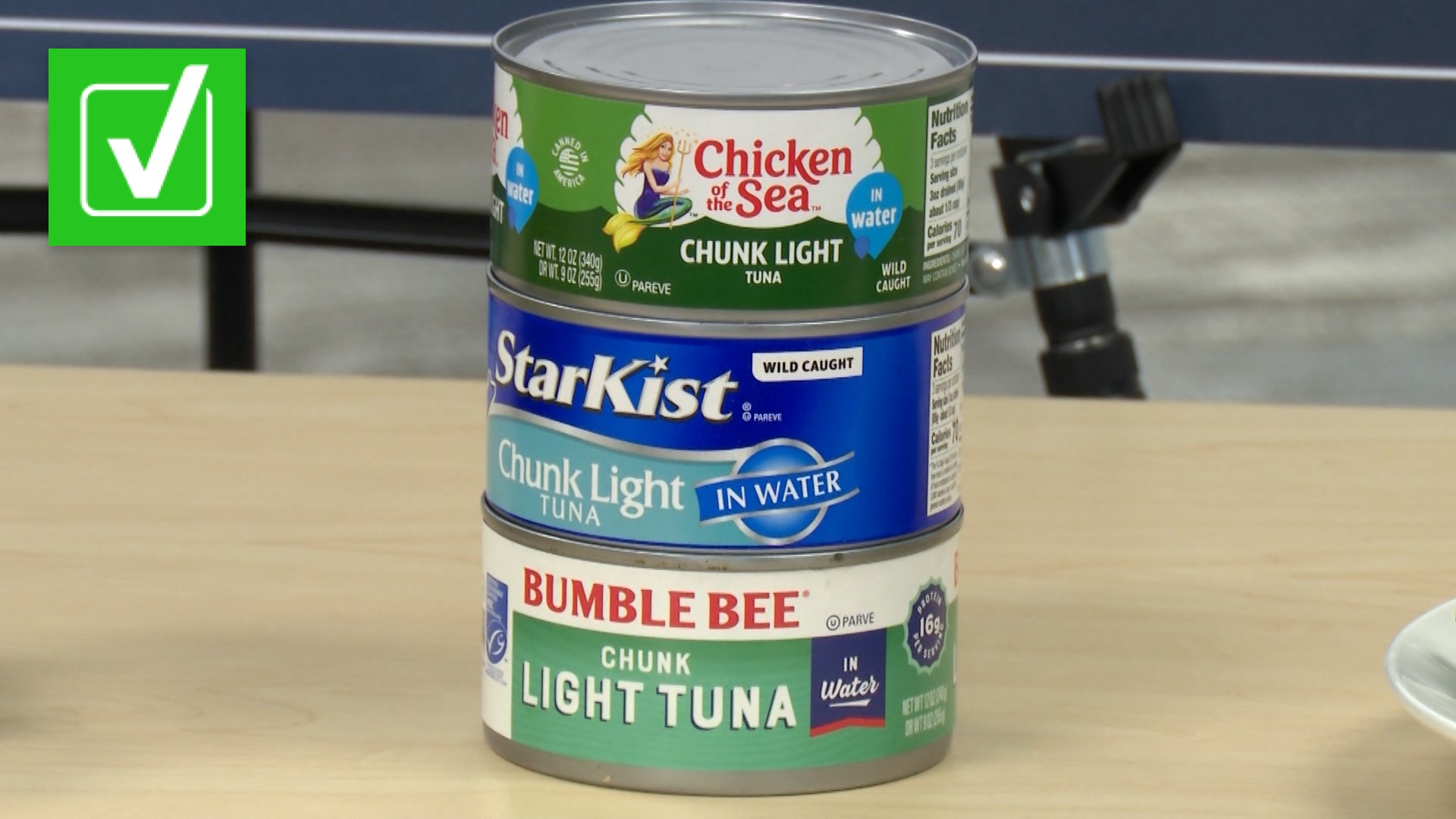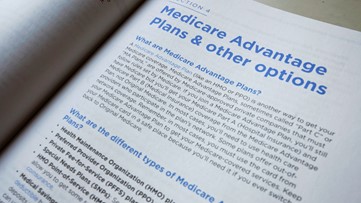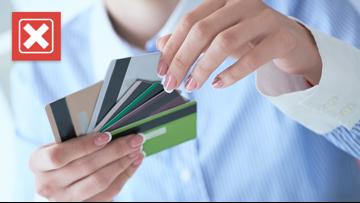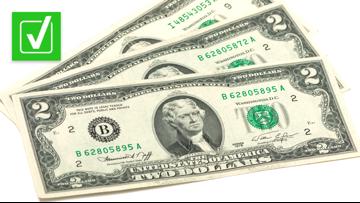OLYMPIA, Wash. — Over two months after the Washington State Attorney General's office announced it was sending out rebate checks, millions of those dollars remain unclaimed.
Attorney General Bob Ferguson announced in December that more than 400,000 Washington households would receive checks due to lawsuits against tuna and chicken providers for price-fixing conspiracies.
The checks were sent to households with income at or below 175% of the federal poverty level. Single-person households received $50. Multi-person households received $120.
Since the checks went out, our Verify team has heard from dozens of viewers with questions about the checks, including:
I received a check for $120 from Atty General of Washington (supposedly) that is for a lawsuit they filed against a corporation for secretly raising prices on chicken and canned tuna. With all the scams going around I am reluctant to cash this check and have it screw up my account...
The check is made out to my husband and he NEVER shops nor does he use a debit card or write a check.
A friend of mine got a letter in the mail supposedly from the Attorney General's office, saying that the $50 check they sent her had something to do with them overcharging for tuna. I need to know if they're really sending out these checks. She's very low-income and I don't want her to cash it if it's not real.
Let's Verify.
THE QUESTION
Are the tuna/chicken rebate checks sent in the mail real?
THE SOURCES
THE ANSWER
Yes, tuna/chicken rebate checks from the Washington Attorney General are real.
The money comes from a 2021 price-fixing lawsuit filed against more than 20 tuna and chicken companies. The Washington State Attorney General's Office claimed the companies that make and sell canned chicken and tuna, "secretly agreed to raise prices for these products in violation of state and federal laws."
Most of the lawsuits have been resolved with companies paying the state Attorney General's Office over $40 million.
"Basically, if you buy chicken, you were impacted by this," Attorney General Bob Ferguson said. "They got together and said, 'Let's not engage in competition, where prices go down, we make less money, Let's get together, inflate prices and keep them there, and get rid of the competition.' Well, guess what? That's illegal."
The Attorney General's Office decided to distribute that money to Washington households whose income is at or below 175% of the federal poverty level. Single-person households received $50. Multi-person households received $120.
All checks were mailed out in December.
Ferguson said more than half the checks have been cashed so far, totaling more than $20 million. However, that means there is still about $20 million in uncashed checks.
How did the Attorney General decide who to send the money to?
The decision to send the money to lower-income households was made by Attorney General Bob Ferguson. We asked him to explain why he made this decision:
So, this case was a little bit unusual from our typical consumer protection case. So, in most of our cases, let's say you overpaid on your Comcast bill by five bucks a month. We had a case like this. Once we beat Comcast in court, we could identify exactly who overpaid that five bucks a month for how many months and had their address and could mail their check to get their money back.
Well, this situation is very different. This conspiracy went on years ago. Nobody has receipts. There are millions and millions of Washingtonians, and while $40 million is a lot of money, we realized very quickly, if we tried to mail every single Washingtonian, the cost would be very high. And those Washingtonians would get only a very few dollars.
So, we thought it made sense, in this instance, to go to folks most impacted. In other words, folks who economically are struggling a bit more.
Examples of those who will receive checks include:
- A family of five with a household income of less than $61,495;
- A single parent raising three kids on an income of $52,500, or less;
- A single parent with two children making less than $43,505 per year;
- A single parent of one, or a retired couple living on two fixed incomes, that total less than $34,510; or
- A retired individual who lives alone on a fixed income of less than $25,515 per year.
What can you do if you lose your check?
If you received a check but lost it or threw it out, you can request the Attorney General's office reissue it. To make the request, call 866-601-1516 and an agent will help you.
The deadline to request a reissued check is May 1, 2024.
I am eligible but didn't get a check. What should I do?
If you think you are eligible for a check but never received one, you can request one from the Attorney General's office.
The office asks you to Submit a Claim, or download and fill out a claim form and mail it in. You can also call 866-601-1516 if you have questions.
The deadline to submit a Claim for Payment is June 5, 2024.
More information is available on the Website for the Chicken and Tuna Price Fixing Settlements.
What should you do with checks sent to wrong addresses or deceased people?
Our Verify team heard from several viewers who said they were sent checks to their address but with someone else's name. Other viewers asked about reports that checks were sent to deceased people.
We asked Ferguson what people should do with these checks:
Obviously, you cannot cash a check that's not in your name. So, if you received a check that came in the mailbox for someone that you know is deceased, just tear it up. That's not too complicated.
I think the last time I checked our numbers, a couple of weeks ago, we had, I think, a little under 200 instances where folks receive checks in the name of someone who passed away.
So, the entity we work with, a private entity, that is helping us find these folks, they go through the Social Security Administration, that's information we get from there. So reliable. But again, as we said before, no system is perfect when you're mailing out 400,000 checks.
So, if you receive a check like that, and you know, it's someone who's deceased, just tear it up. That's all you need to do. If you don't mind reporting it to us, that's helpful as well, so we can track numbers and how things are going.
Outstanding cases
While the Attorney General's office has resolved most of the cases there is still pending litigation against some companies. A trial against Foster Farms, Wayne-Sanderson Farms, and House of Raeford Farms is scheduled for October 2024.
Ferguson said the hope is his office will recover millions of more dollars in the coming months or next year. He says how his office distributes any future dollars will depend on how much money is recovered.
If you have more questions about the refund checks, visit refundcheck.atg.wa.gov, call 866-601-1516, or email refundcheck@atg.wa.gov.
DOWNLOAD THE KREM SMARTPHONE APP
DOWNLOAD FOR IPHONE HERE | DOWNLOAD FOR ANDROID HERE
HOW TO ADD THE KREM+ APP TO YOUR STREAMING DEVICE
ROKU: Add the channel from the ROKU store or by searching for KREM in the Channel Store.
Fire TV: Search for "KREM" to find the free app to add to your account. Another option for Fire TV is to have the app delivered directly to your Fire TV through Amazon.
Apple TV: Search "Spokane News from KREM" in the Apple store or follow this link.
To report a typo or grammatical error, please email webspokane@krem.com.












